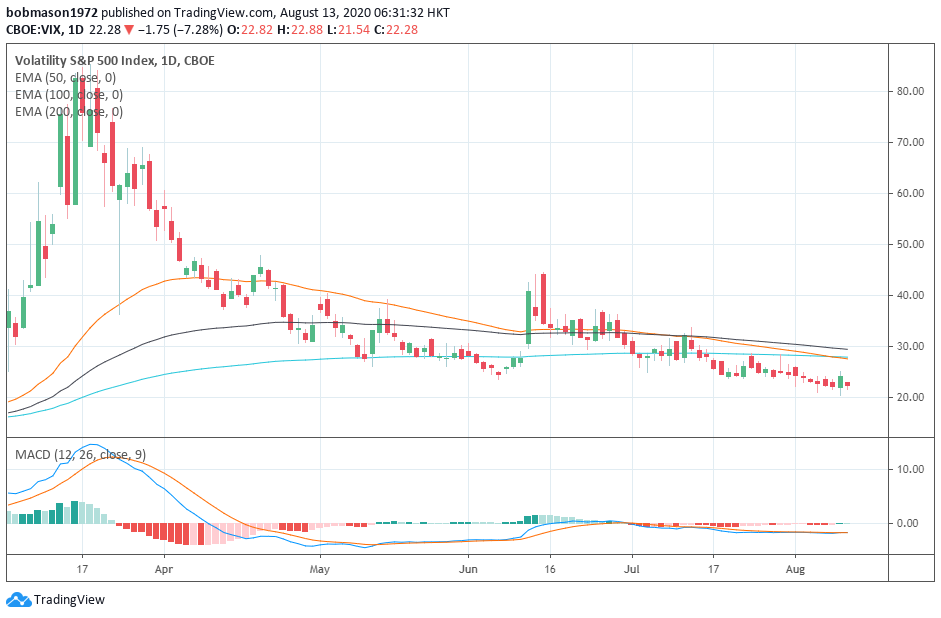European Equities: U.S Weekly Jobless Claims, COVID-19, and Geopolitics in Focus
Economic Calendar:
Thursday, 13th August
German CPI (MoM) (Jul) Final
Spanish CPI (YoY) (Jul) Final
Spanish HICP (YoY) (Jul) Final
Friday, 14th August
French CPI (MoM) (Jul) Final
French HICP (MoM) (Jul) Final
Eurozone GDP (YoY) (Q2) 2nd Estimate
Eurozone GDP (QoQ) (Q2) 2nd Estimate
Eurozone Trade Balance (Jun)
The Majors
It was another bullish day for the European majors on Wednesday. The EuroStoxx600 ended the day up by 1.11% to lead the way, with the CAC40 and DAX30 gaining 0.86% and 0.90% respectively.
The upside on the day came in spite of the continued rise of new COVID-19 cases. New Zealand reported its first cases in over 3-months, with France also reporting a spike in new cases. Germany has also been seeing sizeable daily increases, raising the threat of a more widespread 2nd wave of the pandemic.
From the U.S, there were no further discussions to break the deadlock on the COVID-19 aid package, which was also negative for the majors.
Better than expected economic data in recent weeks and corporate earnings have remained the key drivers.
On the corporate earnings front, ABN Amro was the headline, jumping by 7.4% off the back of better than expected 2nd quarter results.
The Stats
It was a relatively quiet day on the Eurozone economic calendar. Key stats included the Eurozone’s industrial production figures for June and finalized July inflation figures for Italy.
According to Eurostat,
Industrial production increased by 9.1% in June following a 6.2% rise in May. Economists had forecast a 9.2% rise.
Production of durable consumer goods jumped by 20.2%, with the production of capital goods up by 14.2%.
There were also increases in the production of intermediate goods (+6.7%), non-durable consumer goods (+4.8%), and energy (+2.6%).
Slovakia registered the largest increase (+21.7%), while Belgium saw the largest drop (-1.4%).
Year-on-year, however, production was down by 12.3%.
Compared with June 2019, the largest decreases were registered in Portugal (-14.8%), Germany and Spain (both -14.1%), and Italy (-13.7%).
From Italy, consumer prices fell by 0.2% in July, according to finalized figures, which was down from a prelim 0.1% decline.
From the U.S
Economic data included July’s inflation figures. A pickup in inflationary pressures supported the European majors later in the session.
In July, the annual rate of core inflation picked up from 1.2% to 1.6%. Both core consumer prices and consumer prices rose by 0.6% in July.
The pickup in inflationary pressures is unlikely to have any bearing on monetary policy, however. Labor market conditions will likely continue to pin back inflation.
The Market Movers
For the DAX: It was another bullish day for the auto sector on Wednesday. Continental and Daimler rose by 2.06% and by 2.11% respectively to lead the way. BMW and Volkswagen weren’t far behind with gains of 1.63% and 1.55% respectively.
Car sales figures from China continued to deliver support to the auto sector following Tuesday’s rally.
It was also another bullish day for the banks. Deutsche Bank rose by 1.32%, with Commerzbank gaining 0.49%.
From the CAC, it was a bullish day for the banks. Credit Agricole and Soc Gen saw gains of 0.64% and 0.72% respectively, with BNP Paribas rising 0.89%.
It was a mixed day for the French auto sector, however. Peugeot fell by 0.38%, while Renault ended the day up by 0.86%.
Air France-KLM coughed up Tuesday’s gain, falling by 2.40%, with Airbus SE seeing a 1.65% loss on the day.
On the VIX Index
It was back into the red for the VIX on Wednesday. A 7.28% fall marked an 8th day in the red out of 9. Partially reversing an 8.59% rise from Tuesday, the VIX ended the day at 22.28.
In spite of the continued lack of progress on the COVID-19 aid package, economic data and falling U.S COVID-19 cases provided support.
The S&P500 and Dow saw gains of 1.40% and by 1.05% respectively, while the NASDAQ rallied by 2.13%.

The Day Ahead
It’s another relatively quiet day ahead on the Eurozone economic calendar. Key stats include finalized July inflation figures for Germany and Spain.
Barring particularly dire numbers the stats should have a muted impact on the majors.
From the U.S, July’s import and export price index figures and the weekly jobless claims are due out.
Expect plenty of influence from the jobless claims figures. Following last week’s drop, the markets will need to see another marked decline to support riskier assets.
Away from the economic calendar, COVID-19, geopolitics, and updates from Capitol Hill will continue to be in focus.
While there are hopes of further progress towards a vaccine, a continued upward trend in new COVID-19 cases could spook the markets.
The Futures
In the futures markets, at the time of writing, the Dow was up by 18 points.
For a look at all of today’s economic events, check out our economic calendar.
This article was originally posted on FX Empire

